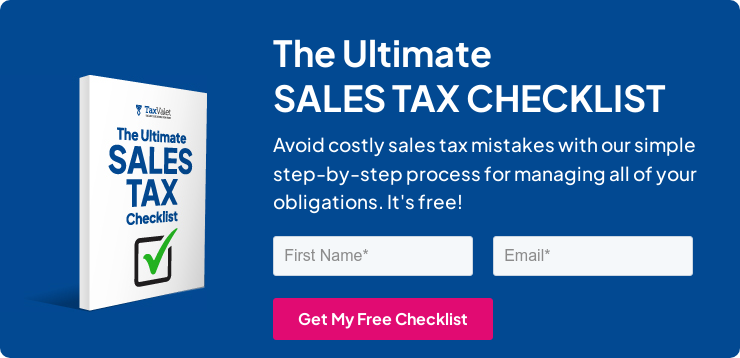Summary: Louisiana’s economic nexus bill, effective July 1st, 2020 requires out-of-state businesses without a physical presence to register to collect and remit sales tax if they have over $100,000 in sales of tangible personal property, products transferred electronically.
For probably the first time in history, Louisiana is late to the party. The sales tax party, that is. Louisiana (finally) finalized details for their economic nexus bill on May 7th, 2020—about a year after the majority of states finalized and implemented their own respective bill.
Louisiana’s Economic Nexus Threshold
Louisiana’s economic nexus thresholds are established based on the following criteria:
- The person’s gross revenue from retail sales (meaning wholesale and resale are excluded) delivered into Louisiana has exceeded one hundred thousand dollars from sales of tangible personal property, products transferred electronically, or services; or
- The person sold for delivery into Louisiana tangible personal property, products transferred electronically, or services in two hundred or more separate transactions. Note: The 200-transaction count threshold is removed effective August 1st, 2023. Click here for more information.
If your business has economic nexus in Louisiana, you should register for a sales tax permit. You can learn more about how to get a sales tax permit on our website by clicking here. Or, if you’d like to hire a team to handle all of your sales tax work for you, you can learn more about our services by clicking here.
Note to reader: This blog post was updated on June 3rd, 2023 to remove the 200-transaction count threshold starting Aug. 1, 2023, and to update what is included in the $100,000 threshold (previously the threshold was gross revenue, and now it is retail sales (meaning whole and resale orders are excluded effective August 1st, 2023).

Don’t Forget About Louisiana’s Notice and Reporting Requirements
Before economic nexus became legal and enforceable due to the 2018 Supreme Court Case Wayfair v. South Dakota, states had “Notice & Reporting Requirements” which effectively forced businesses to either:
- Notify customers of their obligations to pay use tax, and provide a report to Louisiana with a list of your customers and how much use tax they owed (since they didn’t pay sales tax) OR
- Simply begin collecting and remitting sales tax
Louisiana’s Notice & Reporting requirements were so onerous that they effectively “strong-armed” businesses into collecting and remitting sales tax. The thing is, as of today Louisiana still hasn’t gotten rid of their Notice & Reporting requirements.
Louisiana’s Notice & Reporting requirement threshold is $50,000 in gross sales. That means that if you make $50,000 in gross sales and decide not to comply with their customer and state notification requirements (and don’t have a sales tax permit), you could face substantial penalties.
You can read more about Notice & Reporting requirements on our blog post here.
So Should You Register at $100,000 in Sales or $50,000 in Sales?
Since Louisiana hasn’t eliminated their Notice & Reporting requirement law, we are recommending that businesses that cross either the $50,000 in gross sales requirement (from the Notice & Reporting law) OR make more than 200 separate transactions (from the Economic Nexus law) consider registering for a sales tax permit in Louisiana.
Where You Can Go for More Information About Louisiana’s Economic Nexus Law
If you have additional questions about Louisiana’s sales tax requirements for remote sellers, you should check out the following:

Disclaimer: Our attorney wanted you to know that no financial, tax, legal advice or opinion is given through this post. All information provided is general in nature and may not apply to your specific situation and is intended for informational and educational purposes only. Information is provided “as is” and without warranty.
What you should do now
- Get a Free Sales Tax Plan and see how Tax Valet can help solve your sales tax challenges.
- Read more articles in our blog.
- If you know someone who’d enjoy this article, share it with them via Facebook, Twitter, LinkedIn, or email.


